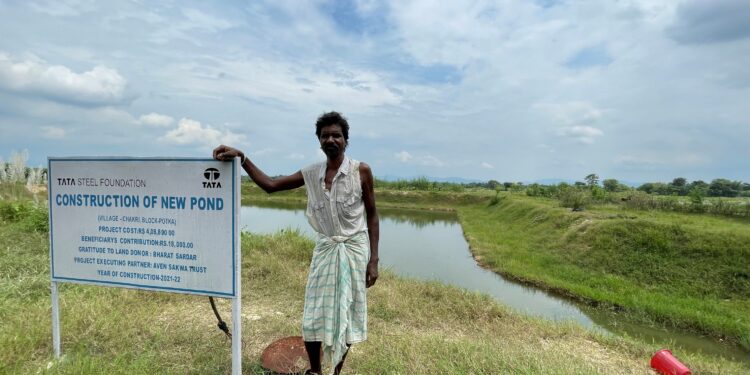Jamshedpur: Tata Steel Foundation’s effort at bringing its farmer base up to speed on Integrated Farming is seeing success at a steady pace. Bharat Sardar, a farmer of the Munda tribe at Chakri village under Potka block of East Singhbhum district of Jharkhand is someone whose farming practices are now catching attention.
Bharat, who owns more than 5 acres of land, recently consented to building a 100×100 ft pond in his farm. “The idea that I could practice multi-cropping and fishery, appealed the most to me,” says Bharat. Integrated farming is the practice of multi-cropping in such a way that the land and nutrients present in the soil are maximised to their full capacity while mitigating the negative consequences of the enterprise on the environment. This helps make farming more efficient and reduce the use of fertilisers and pesticides. Integrated farming also ensures that in the event of one crop failing, there are other varieties that will survive and secure some income for the farmer.
With an estimated annual income of over 1.5 lakh rupees, Bharat feels that the idea to diversify crops, techniques as well as include traditional and scientific means of farming are paying off. He breeds indigenous freshwater fishes like Rohu, Catla and Mrigal, along with raring cows for milk and propagating various crops like rice, bottle gourd, bitter gourd, yellow lentil and papaya. Bharat is a third generation farmer and has been practising the SRI model of farming since 2008. The construction of his pond finished in 2021 and he has been practising integrated farming ever since. Through his training, Bharat has learnt the usage of re-purposing farm waste like cow dung and reducing costs substantially. Cow dung can be used for producing special concoctions like ‘Jeevaamrit’ which can be used as feed in his pond and as fertiliser in his farms.
“I am keen to ensure that my children receive good education and a healthy life with what I am able to earn. Farming desires hard work, patience and dedication, and the results are brilliant. I would not have it any other way,” says Bharat. He is one of the many successes in the East Singhbhum district that have benefited from the construction of new ponds and undertaking the integrated model of farming in their agricultural practices as part of the Integrated Farming intervention anchored by the Tata Steel Foundation. In the days to come, this intervention of the Foundation intends to create replicable models of change and progress by ensuring sustained income generation means, pegged at 1 lakh annually for each of its 1000 farmer base across Jharkhand and Odisha.















